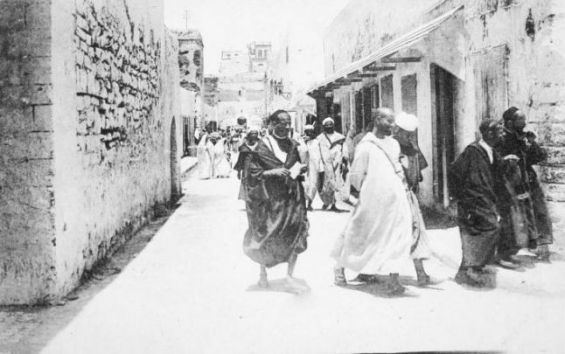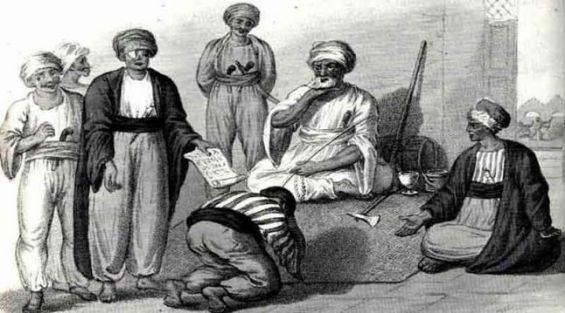Meir Macnin was a cunning merchant but an untrusted diplomat. The Jew who was born in 1760 as Meir Ben Abraham Cohen belonged to one of the most powerful Jewish families that settled down in Essaouira to turn it into Morocco’s principle port of trade.
By the 1780s the trader managed to establish strong connections with the city’s governor. Alongside his brother, Macnin’s business flourished and he worked hard to gather a fortune, he would invest later in England.
Impressed by his story, business activities and journey in London, historian Daniel J. Schroeter dedicated a large chapter to Macnin in his book «The Sultan’s Jew : Morocco and the Sephardi World» (Stanford University Press, 2002).
«In 1787, the young man engaged in what may have been his first speculation in land», wrote Schroeter, explaining that Macnin preferred to buy property in Essaouira to help grow his business.
Escaping the plague
In 1799, however, Macnin decided to leave his brother in Essaouira and embark for a new adventure. Historical sources at hand suggest that the merchant left the flourishing port after the city was hit by a dangerous plague.
His sojourn in England was described in details by Yedida Kalfon Stillman and Norma A. Stillman in their book «From Iberia to Diaspora : Studies in Sephardic History and Culture» (Brill, 1999) who wrote that «the Jewish agent of the governor of Essaouira, Meir Macnin, left the Moroccan port for London on board the ship Aurora».

The ship arrived on June the 1st, 1799 in Gibraltar, where it stayed for two months. The Aurora carried Macnin’s goods : «Calf and goatskins, almonds and gum Arabic», a good amount of merchandise that he collected over the years. He arrived on August the 27th of England but was forced to stay for eight months in the Standgate Creek port. The plague was a nightmare for Macnin, who was obliged with the vessel’s crew and other passengers to stay in the sea.
Fearing the disease, «on January 7, 1800, after protracted parliamentary debate on the matter, the British authorities ordered that the crews and passengers be taken on board other vessels and placed under quarantine for fourteen days», added the two authors.
«On January 18, the three ships were set out to sea, burned and sunk in deep water. The value of the ships, cargoes and personal effects was assessed so that all interested parties could be compensated for their losses. Meir Macnin and his fellow passengers had been abroad the ship for nearly six months».
Commerce in England
After Macnin was compensated, he settled down in England. He took himself a residence in the city, near London’s commercial district. While in England, Macnin knew what his plan was. According to Stillman, Macnin managed to maintain his trading activities using his «close contacts with the Morocco administration».
«He had no difficulty attracting credit in London. His commercial operations there were mostly financed by the governor of Essaouira», added the same book.
On top of that, the Jewish merchant established himself as Morocco’s agent in Europe and most precisely England. But trading, was also a source of troubles for the self-proclaimed diplomat.

In their book Stillman recalls that Essaouira’s governor and Macnin’s brother, Solomon, were arrested after sultan Sulayman realized that «some half million dollars of Makhzan funds were missing».
In fact, the governor was accused of using the government’s money to fund Macnin’s commerce through his brother. Their arrest did not last for too long and, according to the same source, the Macnin brothers reached a settlement with the government.
A diplomat fearing arrest
But in England, Macnin couldn’t repay British creditors and over fifty of them were unable to recover their goods. Macnin wanted to represent Morocco and in London he presented himself as an «official representative of the Moroccan government in London», which was questionable.
Historical accounts suggest that the only contact Macnin had with the sultan was in March 1808, when he «initiated efforts to obtain a ship from the British».
Through the governor of Essaouira, Macnin purchased for Moulay Sulayman a «brig cutter equipped with twelve brass canons» that were delivered to Morocco in three months. However, Macnin failed his sultan as he did not pay for the goods he purchased in London.
The merchant’s dream to represent Morocco abroad came true when Moulay Abderrahman was appointed by his father as Essaouira’s governor. Leaving England for Morocco in 1817, Macnin did everything he could to get closer to the crown prince who ascended the throne after his father died in 1822.
«With the arrival of Moulay Abderrahman, Meir Macnin seemed to be the natural choice for implementing his new opening toward Europe», wrote Schroeter who explained that the Jew was later appointed as Morocco’s ambassador to England.
However, London refused to welcome Macnin as a diplomat, writing in a private correspondence to its consul that «Meir risk arrest if he went to England».

In 1827, the merchant returned to England, claiming that he was sent on a diplomatic mission by the sultan to King George IV’s court. But despite threats that he would be arrested, Macnin stayed in the country and resumed his commercial activities.
Unfortunately, Macnin’s problems with his creditors never ended, which pushed him to return to Morocco. «In the last years of his life, Macnin's financial problems accumulated» and in «1931, David Cohen Macnin, with whom Meir had previously been closely associated, was declared bankrupt».
Four years later, Macnin the Jew merchant and diplomat died in Marrakech, the city where he was born.





 chargement...
chargement...













